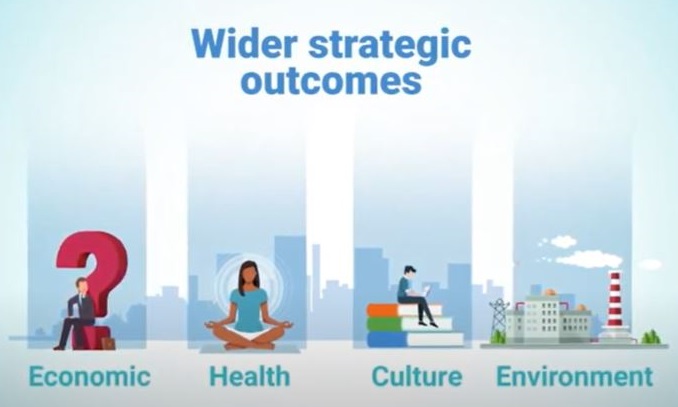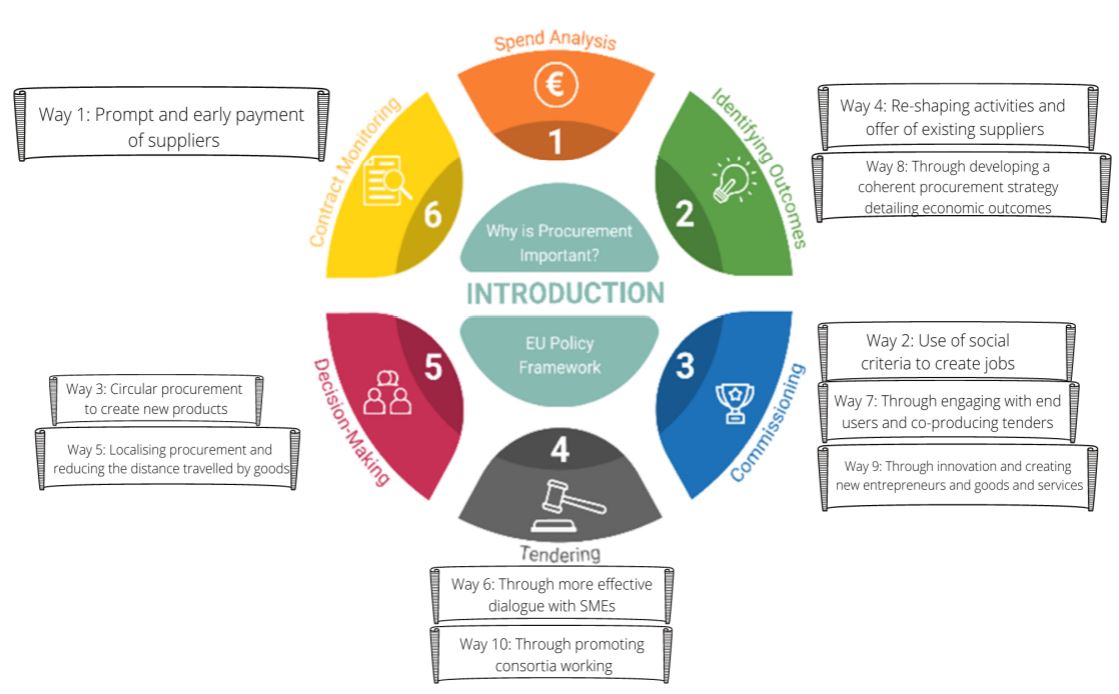Cities must rethink procurement for a healthier economic recovery
Edited on
26 May 2022Ten tips for strategic, integrated public procurement to help local economies bounce back stronger.

Over the last seven years, the URBACT programme has sought to adapt the ways in which towns and cities across the EU think about their purchasing. The URBACT networks Procure and Making Spend Matter, our online course on Strategic Procurement, and our representation on the EU Urban Agenda Partnership for Innovative and Responsible Public Procurement have all sought to shift the perception and practice of procurement away from something very boring and bureaucratic to something that is exciting and effective in addressing the challenges that cities face.
Cities, including their municipalities and other institutions, use procurement every day to buy goods and services, ranging from construction projects to school catering. The process is framed by legislation from the European Commission in the form of the European Procurement Directives – and the choice of suppliers to provide a good or deliver a service has often been on the basis of price alone, with the cheapest offer winning the contract.
Purchasing for recovery: choose quality and wider benefits
 Our work at URBACT helps local governments move beyond price as the primary decision-making factor in procurement. We encourage a much broader consideration of both the quality of the good or service being provided, and its wider economic, social and environmental benefits. How can the procurement of that good or service help tackle youth unemployment? How can the procurement of that good or service contribute to reducing health inequalities? How can it reduce environmental impact and mitigate climate change?
Our work at URBACT helps local governments move beyond price as the primary decision-making factor in procurement. We encourage a much broader consideration of both the quality of the good or service being provided, and its wider economic, social and environmental benefits. How can the procurement of that good or service help tackle youth unemployment? How can the procurement of that good or service contribute to reducing health inequalities? How can it reduce environmental impact and mitigate climate change?
Our thinking at URBACT on procurement continues to evolve. In particular, and as a result of the Covid-19 pandemic, we have been involved in developing a new Action Paper for the EU Urban Agenda Partnership for Innovative and Responsible Public Procurement, published in January 2022 for public feedback. We identified ten ways in which public procurement can be utilised to stimulate and enable economic recovery in a post-Covid world. Municipalities and other institutions should:
- Pay suppliers quickly, enabling the circulation of money within the economy to be quicker and reducing the risk of businesses facing cash flow and liquidation challenges.
- Use social criteria to create jobs, as this contributes towards addressing the key challenge of unemployment, particularly among young people.
- Encourage suppliers to upcycle products using a circular approach. This reduces waste, both in cost and environmental terms.
- Encourage suppliers to adapt their products and offer, enabling businesses to diversify and grow.
- Raise awareness among local businesses of upcoming procurement opportunities. This both enables the growth of local economies and reduces carbon emissions.
- Connect with SMEs – the largest component part of the economy. Towns and cities benefit from supporting these businesses and the jobs they provide.
- Give consumers a say. Citizens are the people who pay for procurement spend through the redistribution of their taxation, and they should have a voice in how that money is spent.
- Be strategic. Develop a coherent procurement strategy, outlining in a clear way the types of economic outcomes the city is seeking to achieve.
- Support innovation, as it enables new goods, services and works to be developed.
- Enable group bids. Bringing organisations together to bid for procurement opportunities enables smaller businesses to deliver economies of scale.

Linking the ten ways to the cycle of procurement
A new, healthier economic recovery
In all of the above, there is a need to consider how we think about ‘economic recovery’. Traditionally, economic recovery would have been predicated by a return to economic growth in the form of Gross Domestic Product (GDP). The Covid-19 pandemic presents an opportunity for a new type of recovery which is framed not only by considerations of economy, but also by addressing social, cultural, health and wellbeing, and environmental challenges.
In terms of the resources that cities have at their disposal to realise this more integrated approach to recovery, we at URBACT firmly believe that procurement is core. Existing money can be levered in different ways to support not only high-quality goods and services, but also contribute towards realising more effective local economic, social and environmental outcomes.
URBACT procurement support for cities
URBACT provides tools, capacity-building and exchange opportunities to ensure procurement is integral to a strong, integrated recovery in EU towns and cities. As well as taking the ten steps described in this article, we invite city hall staff and other urban practitioners to:
- Visit the EU Urban Agenda Partnership on Innovative and Responsible Public Procurement – and read the Action Plan 2022.
- Follow the free URBACT online course on Strategic Procurement, with a new module on Gender-Responsive Procurement due to be released by June 2022;
- Sign up to our quarterly newsletter to join a growing community of peers and keep up-to-date on how to apply procurement more strategically in cities!
Matthew Baqueriza-Jackson is an URBACT Lead Expert and represents URBACT in the EU Urban Agenda Partnership for Innovative and Responsible Public Procurement.
 Submitted by Matthew Baqueri... on
Submitted by Matthew Baqueri... on




